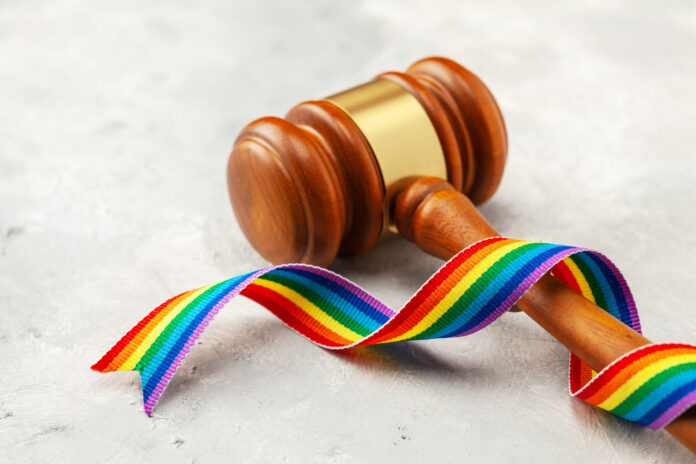Earlier this month, Butler County Common Pleas Judge S. Michael Yeager granted a name change for trans man Jordan Xzavier Hilliard, after a higher court remanded the case back to Yeager for further study.
Hilliard is a convicted felon who was on parole when he applied for a name change last year. But the name-change law in Pennsylvania forbids felons who are on parole from getting a name change.
Advocates for trans individuals say Pennsylvania’s name-change law is unconstitutional. They lauded Yeager’s ruling as further solidifying the rights of trans felons in Pennsylvania to obtain a name change without undue impediments — such as having to wait two years after completing parole before getting a name change.
Advocates also blast a provision of the law that mandates a lifetime name-change ban for persons convicted of severe felonies such as rape and murder.
Hilliard, 37, of Butler, Pa., applied for a name change in February 2022 and had his first hearing before Yeager in May 2022.
At the time of Hilliard’s May 2022 hearing, he was still on parole for a drug-related felony conviction. Thus, at the conclusion of the hearing, Yeager denied Hilliard’s request as premature.
Yeager apparently wasn’t persuaded by Allegheny County Common Pleas Judge Christine A. Ward’s 2021 ruling in a similar case, which specifically declares Pennsylvnia’s name-change statute is unconstitutional.
Ward agreed with critics of the name-change law who argue it unfairly impacts trans felons by impeding their ability to have a name that matches their gender identity.
Critics of the law also claim it violates due-process rights by unreasonably assuming a trans felon is seeking a name change for fraudulent reasons. Additionally, critics say the law violates a trans person’s right to avoid speaking in a manner that’s compelled by the government — such as expressing their dead name.
In May 2022, Hilliard appealed Yeager’s unfavorable ruling to the state Superior Court. In April 2023, the state Superior Court issued a ruling that was favorable to Hilliard by remanding the case to the lower court for further study.
At an Aug. 1 hearing, attorneys for Hilliard emphasized to Yeager the unconstitutional nature of the law. After hearing from multiple witnesses who supported Hilliard, Yeager granted Hilliard’s name-change petition.
But Yeager stopped short of declaring the state’s name-change law unconstitutional. Instead, he said that was an issue for the state legislature to resolve. Yeager was on vacation this week and couldn’t be reached for comment.
Advocates for Hilliard presented Yeager with extensive documentation regarding the importance of allowing trans people to have a legal name that matches their gender identity.
An expert witness, Ayden I. Scheim, submitted a declaration to Yeager stating: “[L]egal name changes are a critical part of gender-affirming treatment for transgender persons and are associated with substantial reductions in the mental-health challenges they too often face.”
Scheim’s declaration went on to state: “Legal name changes may also improve social, health and economic conditions of transgender individuals by reducing their exposure to discrimination, harassment and violence related to gender-incongruent identity documents.”
No one from the state Attorney General’s Office attended the Aug. 1 hearing. Brett Hambright, a spokesperson for the state AG’s Office, told PGN, “We have no comment to offer on the matter.”
Since 2021, at least three Pennsylvania judges have granted name changes to trans felons, including Christine A. Ward of Allegheny County, who specifically said the state’s name-change law is unconstitutional. No court has examined the state’s name-change law and specifically ruled that it’s constitutional.
In court papers, attorneys for Hilliard emphasized the need for their client to have a legal name that matches his gender identity. “Mr. Hilliard strongly objected to the expression of his unwanted name, as evidenced by his name-change petition,” a court pleading on behalf of Hilliard states. “It is a betrayal of his identity and the gender he knows himself to be and in which he lives his life.”
The pleading also states that Hilliard doesn’t want to be “compelled to express his undesired name by force of law.”
According to court papers, Hilliard has been transitioning from female to male for about nine years and has undergone two gender-affirming surgeries.
After the hearing, attorneys for Hilliard expressed approval of Yeager’s ruling.
“We are grateful to the court for diligently and thoughtfully reviewing the evidence and granting Jordan’s name change,” said Transgender Legal Defense and Education Fund (TLDEF) Litigation Director Z. Gabriel Arkles, in a statement. “Coming after similar victories in Pittsburgh and Philadelphia, this outcome underscores that the felony bar is unjust and inconsistent with the [Pennsylvania] constitution.”
“First and foremost, we are very happy for Jordan,” added M. Patrick Yingling, an attorney for the Reed Smith Law Firm, in a statement. “We are also gratified to have yet another ruling that grants a name change over the felony bar, a law that violates the Pennsylvania Constitution and should not stand in the way of anyone who seeks a name change.”
TLDEF Senior Counsel Sydney V. Duncan echoed those sentiments.
“In a moment when anti-transgender hate seems to be at an all-time high, removing unnecessary legal barriers to existence, such as the felony bar in Pennsylvania, is an important step towards preserving the safety and dignity of transgender people,” Duncan said, in a statement. “Whether you are getting stopped by police, going to the doctor’s office, or opening a bank account, having identity documents that accurately reflect who you are only makes our communities safer.”
In an interview with PGN, Duncan added: “This ruling could apply to the broader cisgender felony community as well. It just happens that trans people are bringing the issue to the forefront. It’s Jordan’s trans identity that created a compelling case for him. He was able to show the law, as applied to him, was unjust.”
